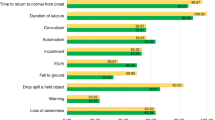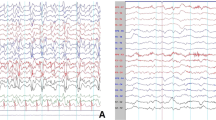Abstract
Nonketotic hyperglycinemia (NKH) is a devastating inborn error of glycine metabolism caused by deficient activity of the glycine cleavage enzyme. Classically, patients present with lethargy, hypotonia, myoclonic jerks, transient respiratory depression in the first week of life and often progress to death. Surviving infants have profound psychomotor retardation, refractory epilepsy and poor quality of life. Currently, no effective therapeutic avenues exist for severe NKH. Ketogenic diet (KD) has been trialled only in a small group of patients with neonatal NKH and early myoclonic encephalopathy, in whom significant improvements in seizure control were reported. We describe an infant with classical neonatal NKH who presented on the third day of life with hypotonia, poor feeding, respiratory insufficiency resulting in ventilatory support and seizures with burst-suppression pattern on electroencephalogram (EEG). KD initiated at age 6 months for intractable seizures, lead to a dramatic decrease in seizure frequency, EEG improvements, normalisation of plasma glycine levels, reduced spasticity and improved quality of life. KD may be a valuable treatment modality for refractory seizure control in classical NKH.
This is a preview of subscription content, access via your institution
Access options
Subscribe to this journal
Receive 12 print issues and online access
$259.00 per year
only $21.58 per issue
Buy this article
- Purchase on Springer Link
- Instant access to full article PDF
Prices may be subject to local taxes which are calculated during checkout


Similar content being viewed by others
References
Van Hove J, Coughlin C II, Scharer G. In: Adam MP, Ardinger HH, Pagon RA, et al., editors. GeneReviews® [Internet]. Seattle (WA): University of Washington, Seattle; 1993–2017. Updated 11 July 2013.
Ohya Y, Ochi N, Mizutani N, Hayakawa C, Watanabe K. Nonketotic hyperglycinemia: Treatment with NMDA antagonist and consideration of neuropathogenesis. Pediatr Neurol. 1991;7:65–68.
Hennermann JB, Berger JM, Grieben U, Scharer G, Van Hove JL. Prediction of long-term outcome in glycine encephalopathy: a clinical survey. J Inherit Metab Dis. 2012;35:253–61.
Swanson MA, Coughlin CR, Scharer GH, Szerlong HJ, Bjoraker KJ, Spector EB, et al. Biochemical and molecular predictors for prognosis in nonketotic hyperglycinemia. Ann Neurol. 2015;78:606–18.
Jaeken J, de Koning T, van Hove J. Disorders of GABA, glycine, serine and proline. In: Blau N, Duran M, Blaskovics ME, Gibson KM, editors. Physician’s Guide to the Laboratory Diagnosis of Metabolic Diseases. 2nd ed. Berlin: Springer; 2002. p. 123–40.
Cusmai R, Martinelli D, Moavero R, Dionisi Vici C, Vigevano F, Castana C, et al. Ketogenic diet in early myoclonic encephalopathy due to non ketotic hyperglycinemia. Eur J Pediatr Neurol. 2012;16:509–13.
Bzduch V, Behulova D, Kolnikova M, Payerova J, Fabriciova K. Ketogenic diet in nonketotic hyperglycinemia. J Inherit Metab Dis. 2010;33(S1):S31.
Nickerson SL, Balasubramaniam S, Dryland PA, Love JM, Kava MP, Love DR, et al. Two novel GLDC mutations in a neonate with nonketotic hyperglycinemia. J Pediatr Genet. 2016;5:174–80.
Nylen K, Likhodii S, Burnham WM. The ketogenic diet: proposed mechanisms of action. Neurotherapeutics. 2009;6:402–5.
Bough K. Energy metabolism as part of the anti-convulsant mechanism of the ketogenic diet. Epilepsia. 2009;49:91–93.
Busanello ENB, Moura AP, Viegas CM, Zanatta A, da Costa Ferreira G, Schuck PF, et al. Neurochemical evidence that glycine induces bioenergetical dysfunction. Neurochem Int. 2010;56:948–54.
Seminotti B, Knebel LA, Fernandes GC, Amaral AU, da Rosa MS, Eichler P, et al. Glycine intrastriatal administration induces lipid and protein oxidative damage and alters the enzymatic antioxidant defences in rat brain. Life Sci. 2011;89:276–81.
Samoilova M, Weisspapir M, Abdelmalik P, Velumian AA, Carlen PL. Chronic in vitro ketosis is neuroprotective but not anti-convulsant. J Neurochem. 2010;113:826–35.
Author information
Authors and Affiliations
Corresponding author
Ethics declarations
Conflict of interest
The authors declare that they have no conflict of interest.
Rights and permissions
About this article
Cite this article
Kava, M.P., Robertson, A., Greed, L. et al. Ketogenic diet, a potentially valuable therapeutic option for the management of refractory epilepsy in classical neonatal nonketotic hyperglycinemia: a case report. Eur J Clin Nutr 73, 961–965 (2019). https://doi.org/10.1038/s41430-018-0286-8
Received:
Revised:
Accepted:
Published:
Issue Date:
DOI: https://doi.org/10.1038/s41430-018-0286-8
This article is cited by
-
Ketogenic diet as a glycine lowering therapy in nonketotic hyperglycinemia and impact on brain glycine levels
Orphanet Journal of Rare Diseases (2022)
-
Genotypic and phenotypic features in Turkish patients with classic nonketotic hyperglycinemia
Metabolic Brain Disease (2021)
-
Tinnitus is multicausal and may not only be related to DNA variants
European Archives of Oto-Rhino-Laryngology (2019)



